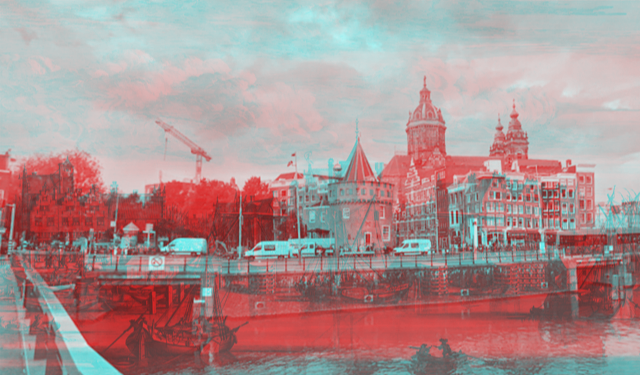 During this workshop, we ideate and explore tactics to turn iconic buildings into visual gateways that address Amsterdam’s stakes in historical trade routes and slavery. By appropriating physical and digital access points and interfaces, we turn them into potential tactical tools to highlight our city’s problematic past. Using fast prototyping techniques we will test out ideas and reflect on the aesthetics of such strategies, their ethical implications and possible impact. Feminist researcher and curator Chandra Frank will start off the workshop with a talk on the intersections of archives, waterways, gender, sexuality and race, and will join us in reflecting on the workshop outcomes.
During this workshop, we ideate and explore tactics to turn iconic buildings into visual gateways that address Amsterdam’s stakes in historical trade routes and slavery. By appropriating physical and digital access points and interfaces, we turn them into potential tactical tools to highlight our city’s problematic past. Using fast prototyping techniques we will test out ideas and reflect on the aesthetics of such strategies, their ethical implications and possible impact. Feminist researcher and curator Chandra Frank will start off the workshop with a talk on the intersections of archives, waterways, gender, sexuality and race, and will join us in reflecting on the workshop outcomes.
Background
Amsterdam’s iconic architecture is well-known and well-loved but many of the beautiful buildings in the city came about against a backdrop of Dutch colonialism and participation in global slave trade. When talking about the history of The Netherlands, these former colonies and the people at whose expense enormous wealth was accumulated are often not adequately accounted for.
Important groundwork of highlighting previously occluded slavery heritage of Amsterdam has been documented in the form of e.g. heritage guide books and guided tours, and more recently, in a large study outlining the personal and political role of the Amsterdam elites. The goal of this event is to creatively and critically explore alternative modalities for storytelling. We warmly welcome students, artists, (UX) designers, storytellers, tour guides, journalists, information designers, cartographers, developers and others with an interest in the topic to join.
This event is part of the Tactical Visual Culture project at the Amsterdam University of Applied Sciences and supported by the Center of Expertise for Creative Innovation. In this project, the Visual Methodologies Collective and the Institute of Network Cultures investigate new visual tools at the crossroads of artistic research, journalism, activism, and data visualization. We explore what tactical visual culture is or could be through three main themes: video witnessing, emotive images, and data feminism.
Practical information
Chandra Frank will provide the opening talk for the workshop, which will be hosted by Loes Bogers and Summer Danoe.
Dr. Chandra Frank is a feminist researcher and independent curator. She is a feminist researcher who works on the intersections of archives, waterways, gender, sexuality and race. Her curatorial practice explores the politics of care, experimental forms of narration, and the colonial grammar embedded within display and exhibition arrangements: www.chandrafrank.com
Loes Bogers is senior lecturer at AUAS, leading the learning community on Critical Making & Research through Design. She also works as researcher at the Visual Methodologies Collective, and is a member of the Amsterdam-based collective Hackers & Designers.
Summer Danoe is currently a student in Communication & Multimedia Design at the Amsterdam University of Applied Sciences. She dedicated her internship with the Visual Methodologies Collective to the theme of this workshop, motivated by a personal interest in colonial histories today: summerdanoe.nl/stage/
Some familiarity with the city of Amsterdam and its history would be very nice, but is not fundamental. No technical skills or special tools are needed besides a browser, a good internet connection and creative tools/media of your choice.
Date/time: Mon 7 Dec 15.00-18.00 (with breaks)
Location: Zoom, Etherpad & Google Slides
This event is free of charge and will be held in English.
To sign up for the workshop, please send an email to: summer.danoe@hva.nl
UPDATE: The event is currently sold out.
Interfacing Amsterdam’s Colonial Histories is part of the event series Tactical Visual Culture, supported by the Centre of Expertise for Creative Innovation (CoECI).
Subscribe to our newsletter or keep an eye on our website and our Twitter and LinkedIn profiles, to stay up-to-date about upcoming Tactical Visual Culture events, publications, and materials.


